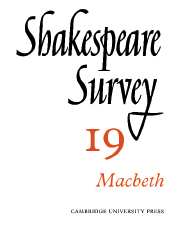Book contents
- Frontmatter
- ‘Macbeth’ in the Twentieth Century
- The Criminal as Tragic Hero: Dramatic Methods
- Antithesis in ‘Macbeth’
- Why was Duncan’s Blood Golden?
- Image and Symbol in ‘Macbeth’
- ‘Macbeth’ and The Furies
- Hell-Castle and its Door-Keeper
- ‘His Fiend-Like Queen’
- The Fiend-Like Queen: A Note on ‘Macbeth’ and Seneca’s ‘Medea
- Shakespeare at Street Level
- New Findings with Regard to the 1624 Protection List
- Shakespeare Productions in the United Kingdom: 1965
- The Royal Shakespeare Company 1965
- The Year's Contributions to Shakespearian Study: 1 Critical Studies
- 2 Shakespeare’s Life, Times and Stage
- 3 Textual Studies
- Index
- Plate Section
The Royal Shakespeare Company 1965
Published online by Cambridge University Press: 28 March 2007
- Frontmatter
- ‘Macbeth’ in the Twentieth Century
- The Criminal as Tragic Hero: Dramatic Methods
- Antithesis in ‘Macbeth’
- Why was Duncan’s Blood Golden?
- Image and Symbol in ‘Macbeth’
- ‘Macbeth’ and The Furies
- Hell-Castle and its Door-Keeper
- ‘His Fiend-Like Queen’
- The Fiend-Like Queen: A Note on ‘Macbeth’ and Seneca’s ‘Medea
- Shakespeare at Street Level
- New Findings with Regard to the 1624 Protection List
- Shakespeare Productions in the United Kingdom: 1965
- The Royal Shakespeare Company 1965
- The Year's Contributions to Shakespearian Study: 1 Critical Studies
- 2 Shakespeare’s Life, Times and Stage
- 3 Textual Studies
- Index
- Plate Section
Summary
In 1960 when Peter Hall became Director of the Shakespeare Memorial Theatre at Stratford-upon-Avon he spoke of forming a company. He wanted a policy. He did not want each production to be a shot at a target chosen by its director in the light of his own limited experience and to serve his individual career. He did not want to provide vehicles for star actors with established reputations and established mannerisms. He talked about creating a real company with its own distinctive character, whose members could gain strength from each other and from a common purpose. Nothing like this existed in England but Peter Hall persuaded a great number of persons to work with him so that in five years he has achieved the best part of his ambition.
Now the Stratford programme can display the company's wide-ranging activity. There are ‘artists under long-term contract’, associate directors and associate designers, teachers engaged for speech, singing, music and movement. The public is assured that the company ‘develop in private in their studio the agility and freedom that Shakespeare’s plays demand’.
- Type
- Chapter
- Information
- Shakespeare Survey , pp. 111 - 118Publisher: Cambridge University PressPrint publication year: 1967

